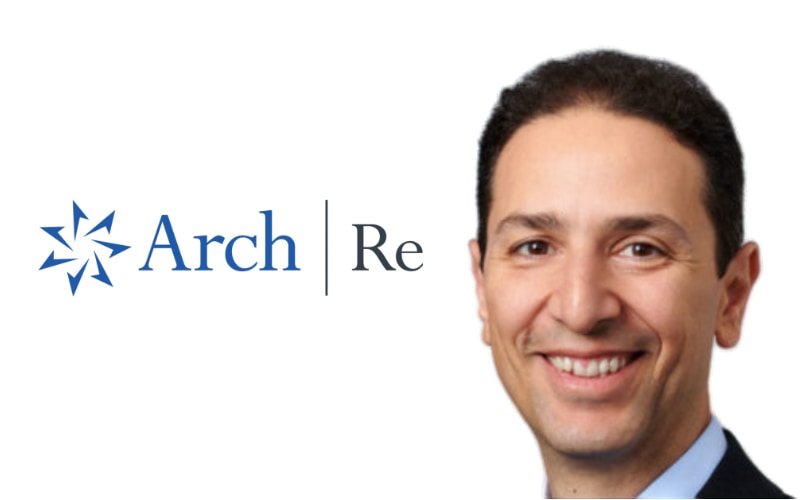After a broad reassessment of the cost of risk, a focus on underwriting discipline is expected to persist at the upcoming renewals and beyond, in what’s expected to be a good market for both primary insurers and reinsurers, according to Maamoun Rajeh, Chairman and Chief Executive Officer (CEO), Arch Worldwide Reinsurance Group.
 With the January 1st, 2024, reinsurance renewals fast approaching, we spoke with the head of Arch Worldwide Re about the market environment and outlook following some challenging renewals this year.
With the January 1st, 2024, reinsurance renewals fast approaching, we spoke with the head of Arch Worldwide Re about the market environment and outlook following some challenging renewals this year.
“I do think there’s been an across the board reassessment of the cost of risk and the price of volatility as return thresholds have become critical,” said Rajeh. “I’ve always argued this is not a capacity constrained market, this is a threshold driven market. Above a certain mark you get a lot of capacity, and below it is tumbleweeds.”
Rajeh emphasised the need to appreciate the fact capital simply hasn’t made the returns expected from shareholders and capital providers, and that it’s ultimately been a long time across a broad spectrum of products that the industry has underperformed.
“I think that moment now has turned, and to the extent that there’s capital deploying in our business, that capital is requiring threshold returns, rationally so,” said Rajeh.
“From a reinsurer perspective, what’s important to us is that our clients are able to afford the cost of reinsurance. And the fact that the primary environment is healthy and is getting rate makes it so that the system works. The system is healthy and healthy clients are the best sort of clients,” he added.
According to Rajeh, Arch’s outlook for 1.1 2024 is a continuation of the current trend in which underwriting discipline is paramount.
“Arch approaches this from a collaborative place with our clients and brokers. We see ourselves as problem solvers. We’re willing, and we have the capital and ability to solve those problems. And, what we’ve been able to do has resulted in growth not just in volumes, but also horizontally with clients.
“And so, from that vantage point, we come into 1.1 feeling like it’s a good market for primary players and for reinsurers, and that the system has enough margin in it to meet thresholds for all participants,” explained Rajeh.
One thing that Rajeh would like to see more of in 2024, is communication and transparency between all the stakeholders.
“That’s how deals get done. An orderly market really only happens when you have transparent communication with your clients to get it done.
“Otherwise, everything gets seized up in the last week of the year. And I put that out there as more of a caution than anything else. Because, absent people taking stances that are not constructive to getting transactions done, I believe 1.1 should get done in a way that leaves everyone feeling better relative to 1.1 2023, and that enables the market to actually grow.
“If intermediaries bring parties together constructively, there is no reason why deals don’t clear, and clear in a manner that satisfies everybody,” said Rajeh.
While clearer than at 1.1 2023, Rajeh noted that this is not proving to be an early renewal, with some late trading expecting to go into the first week of January.
“I think there should be fewer surprises, but surprises are relative to expectations. Mid-year, the market was orderly only because there was a reset in expectations. So, the question becomes, how do people extrapolate from mid-year to 1.1 2024? Not everyone will extrapolate the same way. So, there could still be some surprises towards the last few days of the trading period,” said Rajeh.
In recent years, Arch has reported some impressive growth across all of its business segments, and the current market environment points to further growth in the months ahead.
“If I think about demand in the business, I expect increased demand in property cat. Some of that demand has been delayed, but inflation only works one way. So, in the instance that inflation increases values and compresses layers, what happens is that clients are no longer utilizing our balance sheets anymore, they’re retaining it on their balance sheets.
“And, at some point in time that’s a decision they make. If that’s a consistent change in their risk retention protocols, then yes. If not, at some point that demand is rational and that demand will come through,” said Rajeh.
“So, I continue to believe that we’re going to see demand increase in property cat, and then in lines that are growing materially like cyber, for example, we also expect that our balance sheet will come into play for our clients.
“These are areas where we expect demand driven growth, and other areas where the margins meet our thresholds and our clients need solutions, we’re there and we’re happy to continue to grow and continue to serve our clients,” he concluded.


